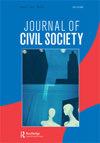Social capital and polarization: The case of Polish think tanks
IF 0.9
Q3 POLITICAL SCIENCE
引用次数: 0
Abstract
ABSTRACT In this article, we study polarization within civil society. While earlier research on civil society has shown that civil society organizations can be divisive, research on polarization has only paid scant attention to the role of civil society. We bring these two aspects of the literature together to develop a framework for analyzing social capital in a polarized context. The framework helps identify practices that organizations may engage in when shaping social capital and working with others: facilitating the flow of information; providing credentials for actors; influencing agents; and reinforcing identity and recognition. Importantly, while originally developed for a fundamentally positive analysis of the mechanics of social capital, this framework includes inverted practices. In our analysis, we observe a bifurcation of actions depending on what role they play in the polarization dynamic – integrating relations within the poles or separating relations between the poles. In this sense, social capital contributes to intensified polarization. Empirically, the article is based on a dataset of 30 interviews with 24 policy-oriented civil society organizations (CSOs), here termed think tanks, in Poland.社会资本与两极分化:波兰智库的案例
摘要在这篇文章中,我们研究了公民社会内部的两极分化。虽然早期对民间社会的研究表明,民间社会组织可能会造成分裂,但对两极分化的研究却很少关注民间社会的作用。我们将文献的这两个方面结合在一起,形成了一个在两极分化的背景下分析社会资本的框架。该框架有助于确定各组织在形成社会资本和与他人合作时可能采取的做法:促进信息流动;为行动者提供证书;影响因素;以及加强身份认同。重要的是,虽然最初是为了从根本上积极分析社会资本的机制而开发的,但该框架包括倒置的实践。在我们的分析中,我们观察到动作的分叉,这取决于它们在极化动态中扮演的角色——极点内的积分关系或极点之间的分离关系。从这个意义上说,社会资本加剧了两极分化。从经验上讲,这篇文章是基于对波兰24个政策导向的民间社会组织(CSO)的30次采访的数据集,这些组织在这里被称为智库。
本文章由计算机程序翻译,如有差异,请以英文原文为准。
求助全文
约1分钟内获得全文
求助全文

 求助内容:
求助内容: 应助结果提醒方式:
应助结果提醒方式:


